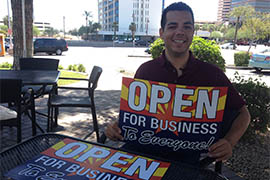Cronkite News has moved to a new home at cronkitenews.azpbs.org. Use this site to search archives from 2011 to May 2015. You can search the new site for current stories.
Activists: Tempe anti-discrimination vote speaks to statewide momentum
To activist Joshua Zaragoza, Tempe’s overwhelming approval of workplace protections for lesbian, gay, bisexual and transgender municipal workers is a springboard for other cities to pass non-discrimination measures.
“The objective and the goal in those cities would be to see a non-discrimination ordinance passed to send a message across the state and the country that those cities are open for business to everyone,” said Zaragoza, senior field organizer for the Human Rights Campaign in Arizona.
On Aug. 26, voters overwhelmingly approved Proposition 475, making Tempe the first Arizona city to amend its charter to ban discrimination against LGBT city workers. The measure also includes workplace protections for veterans.
Though Phoenix, Flagstaff and Tucson have also adopted nondiscrimination ordinances, Tempe was the first to add permanent protections to its city charter, which is kind of like a municipal constitution.
Zaragoza said Tempe is just the beginning “in a wave of equality in municipalities across Arizona” enacting similar ordinances. Arizona is one of 29 states with no law protecting people from workplace discrimination based on sexual orientation.
To Zaragoza, Tempe voters sent the loudest message yet in the fight for LGBT rights in Arizona because Proposition 475 passed by popular vote. Unofficial results showed the vote was 69 percent in favor of the measure, 30 percent opposed.
The ballot proposition was introduced in February, just after Tempe City Council unanimously passed an ordinance prohibiting discrimination based on sexual orientation and gender identity. The proposition expands on that ordinance by adding LGBT protections to the city’s charter, which can only be changed by voters.
“No one ever wants to go against the voters’ will,” Zaragoza said. “And the voters on Tuesday night in Tempe sent a loud and clear message that they want a fully-inclusive and equal city.”
Tempe Councilman Kolby Granville said the ordinance and statute were planned simultaneously after SB 1062 passed the state Senate, which would have allowed businesses to refuse service to LGBT customers based on the owner’s religious beliefs. Gov. Jan Brewer ultimately vetoed the bill.
“After passing the ordinance, no one seemed to mind or care,” Granville said. “So we said, ‘Let’s add it to the charter so it would be part of our constitution.’”
By approving the measure, Granville said Tempe voters have made the policy that much harder to overturn.
“It’s a symbol that not only do we believe in equality but we believe equality shouldn’t be taken away,” Granville said.
The Center for Arizona Policy, a conservative lobbying group that helped draft SB 1062, was against Proposition 475 because it would be more difficult to roll back, according to legal counsel Josh Kredit.
“These laws can be really abused to go after people of faith,” Kredit said.
But Joe Garcia, director of communication at the Morrison Institute for Public Policy at Arizona State University, said Proposition 475 clearly demonstrates how Arizona’s cities are moving beyond the state’s “retro” stance on gay rights.
“The state Legislature represents the status quo,” he said. “Whereas the cities, by and large, want to go forward in a progressive way.”
According to Garcia, Tempe made a strategic economic move in putting the issue up for a vote.
“People know they can go to Tempe and it’s gay friendly,” Garcia said of businesses, tourists and shoppers alike. “Something like this is an economic developer.”
Zaragoza with the Arizona Human Rights Campaign echoed the sentiment, pointing to the success of the “Open for Business to Everyone” campaign by ONE Community, which was founded in response to SB 1062. Participating businesses place a sign in the window indicating that they’re open for business to all customers, regardless of sexual orientation.
Using Tempe as a model, Zaragoza said they’re looking to expand LGBT workplace protections to other cities in the Valley, including Scottsdale, Mesa, Glendale and Chandler.
In late August, Scottsdale City Council approved the city’s signature on the UNITY Pledge created by ONE Community to build a network of Arizona businesses and organizations dedicated to advancing workplace equality.
ONE Community co-founder Angela Hughey said Scottsdale’s move shows that more municipalities understand that adopting a “fully-inclusive, non-discrimination ordinance” is good for business and “attracts top talent.”
Zaragoza said this kind of “city-by-city, town-by-town approach” builds momentum for a potential statewide initiative for workplace equality.
“It sends a message that if you’re a hardworking Arizonan doing their fair share who happened to be gay or transgender, you shouldn’t be treated differently,” Zaragoza said.







